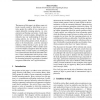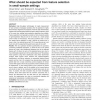11 search results - page 2 / 3 » Skepticism and floating conclusions |
CORR
2002
Springer
13 years 5 months ago
2002
Springer
The purpose of this paper is to address some criticisms recently raised by John Horty in two articles against the validity of two commonly accepted defeasible reasoning patterns, ...
CI
2004
13 years 5 months ago
2004
We present a general approach for representing and reasoning with sets of defaults in default logic, focussing on reasoning about preferences among sets of defaults. First, we con...
EUROSYS
2006
ACM
14 years 2 months ago
2006
ACM
Nearly ten years after its first presentation and five years after its first application to operating systems, the suitability of AspectOriented Programming (AOP) for the devel...
ISPASS
2008
IEEE
13 years 11 months ago
2008
IEEE
The floating point portion of the SPEC CPU suite and the HPC Challenge suite are widely recognized and utilized as benchmarks that represent scientific application behavior. In th...
BIOINFORMATICS
2006
13 years 5 months ago
2006
Motivation: High-throughput technologies for rapid measurement of vast numbers of biological variables offer the potential for highly discriminatory diagnosis and prognosis; howev...


